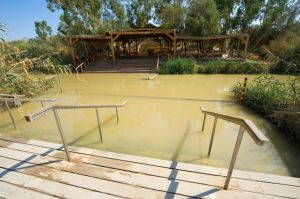 Over the past several years, Jordan has worked to remove thousands of personnel and anti-tank mines from under the ground along the southern banks and surrounding area of the Jordan River. The explosives, buried mostly by Jordanians and Syrians, were a legacy left from the 1950s and 1960s. For decades, the existence of the mines prevented full public access to the area. The removal of the devices, along with conservation efforts aimed at cleaning up and restoring the river, is clearing the way for resurgence in tourism to the place believed by many people to be the baptismal site of Jesus.
Over the past several years, Jordan has worked to remove thousands of personnel and anti-tank mines from under the ground along the southern banks and surrounding area of the Jordan River. The explosives, buried mostly by Jordanians and Syrians, were a legacy left from the 1950s and 1960s. For decades, the existence of the mines prevented full public access to the area. The removal of the devices, along with conservation efforts aimed at cleaning up and restoring the river, is clearing the way for resurgence in tourism to the place believed by many people to be the baptismal site of Jesus.
Removal a Complicated Process
Authorities have been in the process of cleaning up the mines since the 1994 peace treaty with Israel, but several factors have made completion difficult. The sheer number of mines posed a challenge. While maps existed to show the locations of the devices, weather and shifting soil rendered the maps inaccurate. Still, authorities are confident that they have done a thorough job, and that the area is now safe for visitors. To further wash the area of its martial association, derelict military outposts have been repurposed to serve as rest and recreation stops. In addition, officials hope to encourage the development of agriculture, as well as the return of native wildlife.
Controversy Over Sacred Site
A popular baptismal spot on the Israeli side of the river sits across and upriver a bit from the Jordan site. Pilgrims from Eastern Orthodox, Catholic and some Protestant churches continue to travel to Israel at Epiphany to celebrate:
- The visitation of the three kings to the infant Jesus
- The revelation of Christ as Savior
- Jesus' public ministry
The Jordan River is sacred to Christians as the place where John the Baptist administered baptism to Jesus. Lately, researchers are becoming more and more convinced that the rite actually occurred on the east bank, or the Jordan side, rather than on the west bank. An ongoing archaeological dig has revealed an early Christian font, and possibly the cave where the prophet lived.
Spirit of Cooperation
Jordan officials hope the discoveries draw Israel and Jordan closer together, rather than push the two countries apart. Tourism is a significant source of income for Jordan, a country that has opened its doors to displaced people from Iraq, Syria and other embattled places. Although marketing strategy touts the slogan, "Jordan, the birthplace of Christianity," the majority of its citizens are Muslim. A recent visit from Pope Francis catapulted the idea of Jordan as a sacred destination for Christian pilgrims. Religious figures such as the Archbishop of Canterbury and Rick Warren, an American Protestant minister, have also publicly supported the Jordan bank as a holy site. Increased attention has encouraged the Catholic Church to build a large facility in the Jordan Valley.
A Delicate Balance
Christians regard the site of Jesus' baptism as one of the three holiest places in Christian history, after Bethlehem and the Church of the Holy Sepulchre in Jerusalem. Religious tourism can be fraught with difficulty, particularly in an area of the world that means so much to so many people of different faiths. Jordan is navigating an ambitious path, socially, economically and ecologically. With good stewardship, the cleanup and restoration of the southern Jordan Valley may not only provide a space that is welcoming to pilgrims, but it may also offer hope for a rejuvenation of a natural landscape long embattled in territorial strife. Travelers who venture to Jordan to witness or participate in a baptism are also likely to experience the constant military presence. The ongoing unearthing of historical artifacts combined with the restoration of the baptismal site might prove to be a fruitful series of events for a country trying to find peace and prosperity in the modern landscape.
Add Your Comment